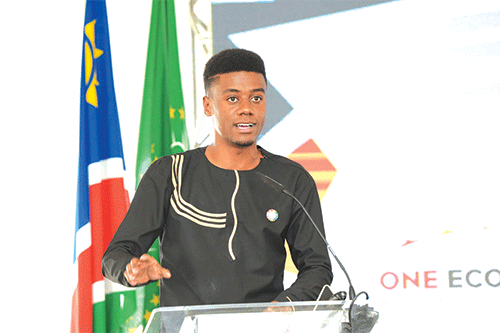Rivaldo Kavanga
In the corridors of our nation’s schools, a crisis unfolds, hidden from the jubilant celebrations of free education.
As Namibia stands at the crossroads, with our education sector teetering on the brink of collapse, the impending national budget announcement by finance minister Ipumbu Shiimi is awaited with bated breath.
The promise of free primary and secondary education, a beacon of hope a decade ago, now casts long shadows of burden on the State’s coffers and the spirits of our learners.
A visit to a local high school in Windhoek reveals the dire state of affairs. Amidst the backdrop of broken tiles and unkempt classrooms, a teacher’s frustration boils over, “When we plead for contributions, you preach free education”, highlighting the profound difference between idealistic policies and realities on the ground.
This scenario is not isolated, but a widespread testament to the crumbling infrastructure and diminishing quality of education — a direct fallout of our free education policy.
Crisis
Namibia’s stride towards universal free education was a commendable step, aligning with our constitutional mandate and earning global accolades. Yet, the shine of this achievement has dulled under the weight of underfunded promises.
Government struggles to disburse the funds necessary for basic educational resources, pushing the burden onto parents.
This shift marks a departure from a time when the government could afford textbooks and stationery, to an era where parents are unwittingly shouldered with the government’s responsibilities.
The repercussions are manifold: dilapidated school buildings, overcrowded classrooms, and a growing disenchantment among learners, many of whom drift away from education each year.
This cycle of decline, met with lip service rather than actionable solutions, underscores the urgency of revaluating our approach to free education.
Solutions
The crisis at hand is not merely a question of resources, but of vision and allocation. The clarion call for rescuing our education sector from the precipice of failure necessitates a dual approach: bolstering infrastructure and reimagining resource distribution.
The appeal to minister Shiimi is straightforward—prioritise education in the national budget. However, this plea comes with a stipulation: the allocation must be strategic, aiming for a tangible return on investment. This entails not only budgeting for employment costs, but for constructing and refurbishing school buildings, and also ensuring a steady supply of educational materials and resources.
In a scenario where fiscal constraints continue to throttle our ambitions, a pragmatic solution beckons: reintroducing minimal, voluntary contributions from those who can afford it. This model, blending the ethos of free education with a sustainable financing mechanism, could offer a lifeline to our beleaguered schools.
Action
As Namibia stands on this precarious ledge, the time for action is now. Our education sector’s decline is not irreversible, but averting a collapse demands immediate, decisive action. The legacy of free education, meant to empower the next generation, must not devolve into a cautionary tale of good intentions gone awry.
Therefore, it falls upon us — policymakers, parents and the community at large — to forge a path forward that honours our commitment to education without compromising on the quality and accessibility that every Namibian child deserves. The future of our nation depends on it.
*Rivaldo Kanongo Kavanga is a youth leader passionate about the SDGs and education.


